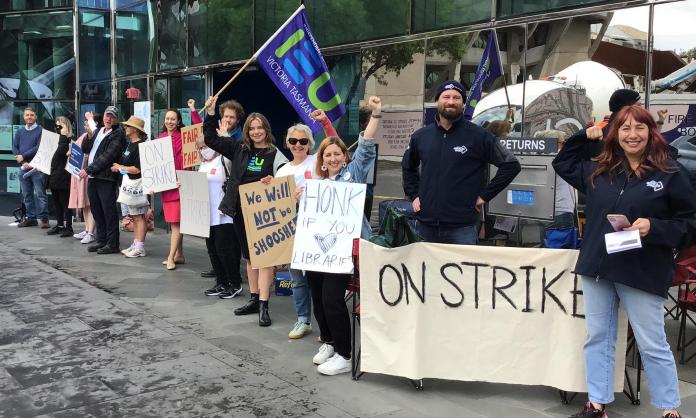Australian Services Union members in the Geelong public library system have achieved a hard-fought victory. After months of gruelling negotiations with management, and industrial action unprecedented for the library sector, workers finally came away with a new enterprise agreement that incorporates many of their demands.
Foremost on the workers’ list was pay. Despite Geelong’s libraries being regarded as the best in Victoria, they were ranked 45th in a field of 49 libraries in terms of pay for entry-level customer service staff. The final agreement included pay rises of more than 2 percent per year for most staff, and close to 5 percent in each of the first two years for the lowest paid staff. It is structured in such a way that entry level customer service staff, who are the lowest paid, will get an immediate increase of almost 10 percent. This will be enough to push pay at Geelong library up from 45th to roughly 20th in the state.
Another big issue was safe car parking for staff at the central Geelong Library. There is no free car parking in central Geelong, so library staff, many of whom are women, were forced to walk 20 or 30 minutes to their cars at night when they finished their shifts. Despite the progressive image that the Geelong Regional Library Corporation (GRLC) has cultivated, management was doggedly opposed to doing anything about this during the 12 months of negotiations. In the end, however, they caved. Now, staff that finish after 8pm in non-daylight saving months are entitled to free taxis to their parked cars.
Other victories include: the early closure of libraries before public holidays with staff on full wages, strict limits of the use of short-term contracts, three-hour minimum shift lengths, paid gender-transition leave, guaranteed right to two 15-minute tea breaks in a 7-hour shift, rights for union delegates and the inclusion of delegates in staff inductions and, for the first time, Sunday and late-night penalty rates for venue hire staff.
None of this was in management’s original log of claims, which aimed to significantly roll back pay and conditions. Management initially offered no pay rise in the first two years, and 1 percent in each of the last two. They also wanted to eliminate Saturday afternoon penalty rates, reduce evening penalty rates, and increase evening and weekend work. All of these claims were eventually withdrawn.
According to union member Joey (not their real name), library staff were subjected to 18 months of stone-walling from management. Regular emails from the CEO contained thinly-veiled threats to jobs, and several staff were told their pay would be docked for amounts of time as small as 12 seconds for handing out union leaflets on the job. The CEO even sent an all-staff email to justify underpaying staff—most of whom are women—by noting that industries in which women work are usually paid less!
Staff countered this with determined, systematic industrial organising among 180 total staff across the network of 19 libraries. They repeatedly voted down offers from management which didn’t address their concerns. This culminated in two half-day stop works at the largest and most important library in central Geelong, and a 24-hour strike that included several other libraries as well. The November 24-hour strike, in particular, was a massive coup for library staff.
“So many people were only too happy to strike—a lot of people wanted to show management we were serious, and once the vote to strike was taken, it acquired a massive momentum” Joey told Red Flag. According to Joey, a total of nine of the 19 GRLC libraries were forced to close on the day. The GRLC Library Board was due to have a fully-catered meeting at the central library on the same day, which was embarrassingly forced to take place on zoom due to the strike.
Industrial action like this is unprecedented in the public library sector and it left management scrambling for a response. They were forced to remove the head of human resources from the negotiations and sack their anti-union lawyer, as it became clear that they had lost control of the situation. Patti Manolis, the notorious CEO of GRLC, was also forced to resign, and the entire executive resigned one-by-one in the months that followed.
How did library staff achieve all this in the middle of a pandemic? They handed out leaflets on the job that detailed the union’s demands, and countered managements misinformation and thinly-veiled threats. They regularly held raucous, democratic union meetings to update members on the negotiations and discuss next steps. They cultivated support from the local community by handing out leaflets to library users and by linking the demands of library staff to the conditions faced by all workers. A committee with representatives from almost all the library branches met weekly to plan strategy and build support for industrial action.
All of this has had an electrifying effect on staff. Union membership ballooned to 60 percent across the library network. A culture of participatory democracy has flourished among a union membership that was largely inactive only a couple of years ago.
“We didn’t get everything we wanted,” says Joey, “but we got so much more than we would have if we hadn’t done all this. Even the people who wanted to keep going [with the negotiations] were still really happy. We pulled all this off in the middle of the pandemic. Boosted membership massively, organised the workforce and so much more. I’m blown away by what we’ve accomplished.”










